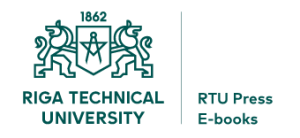Vienšūnu proteīnu un vienšūnu eļļu ražošana no agroindustriālajiem blakusproduktiem
Summary of the Doctoral Thesis
Krišs Spalviņš, Riga Technical University, Latvia
The aquaculture industry has been the fastest growing food production industry in the world for the last 25 years. In turn, wild capture has been stagnant for the last 20 years. As a result, in 2014 the aquaculture industry outpaced wild capture and today most fish and shellfish products are farmed in aquaculture rather than caught. Although aquaculture has a number of advantages over wild capture, the rapid development of aquaculture has led to a shortage of fish feeds. The aquaculture industry has tried to solve the feed shortage by replacing traditional feed ingredients with ones derived from agriculture, but this solution is inappropriate because plant-based ingredients are not suitable for the intestinal tract of farmed carnivorous fish, they lack several essential amino acids, and vegetable fats do not contain Omega-3 fatty acids essential in human diet. Therefore, it is necessary to find new raw materials that are suitable for use in fish feed, do not create additional burdens on the environment as wild capture and agriculture do, and also ensure that fish products fed with new raw materials are healthy for human consumption. The most suitable ingredients for these requirements are single-cell proteins (SCP) and single-cell oils (SCO). SCP and SCO are derived from microorganisms that are able to produce large amounts of proteins or oils in their cells. Currently, SCP and SCO production technologies are already used to produce high value-added products, such as pharmaceuticals, building-block chemicals, baby food, etc. However, these technologies involve the cultivation of the relevant microorganisms using refined sugars, which are relatively expensive and the use of such raw materials in the production of fish feed is not competitive. Therefore, in order to implement SCP and SCO technologies in the production of fish feeds, it is necessary to find cheap raw materials for the cultivation of microorganisms. The most suitable raw materials for the cultivation of microorganisms are biodegradable by-products of various industries.
The aim of the work is to analyse the most suitable by-products for the cultivation of SCP and SCO producing microorganisms. The analysis includes: (1) literature analysis on all suitable by-products, describing the characteristics, availability and reported SCP and SCO yields when using by-products as substrates; (2) the development of a by-product supply optimization model and a case study for one by-product using the developed model; (3) creation of a laboratory stand for practical experiments; (4) experiment where SCP is produced from a previously unexplored by-product and a microorganism strain combination.
The dissertation is created as a set of publications, which combines parts of scientific publications written during doctoral studies.
The introduction to the work describes the aims and tasks of the work, as well as a description of scientific and practical significance. The first chapter describes the current situation in the aquaculture industry, the causes of fish feed shortages, possible solutions and the rationale for the production of SCP and SCO from by-products as the best alternative for the production of fish feed ingredients. The second chapter reviews the by-products that are suitable for the production of SCP and SCO, as well as describes the development of a by-product procurement model and a case study. The third chapter describes the creation of a laboratory stand. The fourth chapter describes practical experiments for obtaining SCP from waste cooking oil. At the end of the work, conclusions are made and recommendations are given.
Additional information
| DOI | |
|---|---|
| Publication type | |
| Defence date | 31.08.2020. |
| ISBN (print) | 978-9934-22-485-0 |
| ISBN (pdf) | 978-9934-22-486-7 |
| Format | |
| Pages | 25 |
| Published online | |
| Publisher | RTU Press |
| Country of Publication | Latvia |
| Publication language |
You must be logged in to post a review.




Reviews
There are no reviews yet.